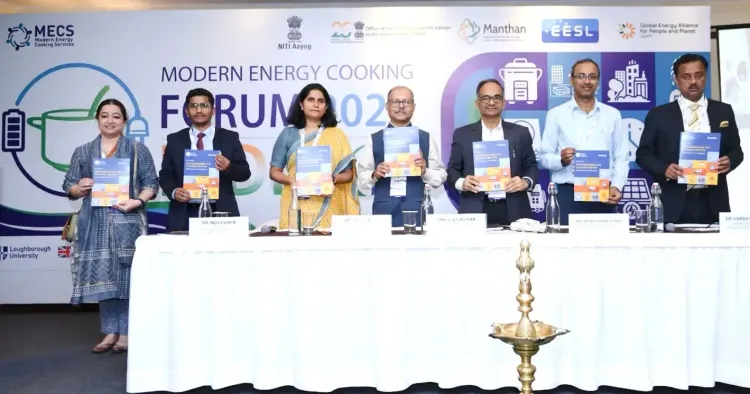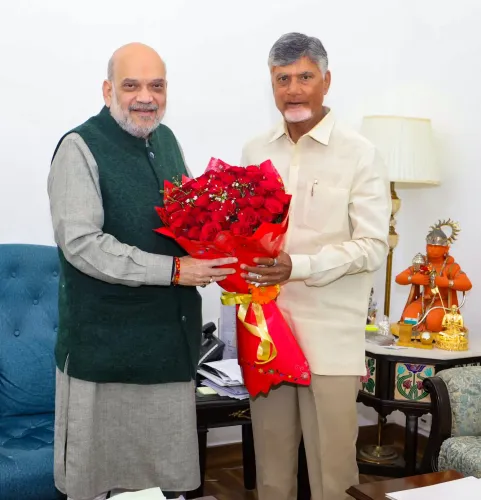How can decarbonising India’s cooking sector help achieve net zero by 2070?

Synopsis
Key Takeaways
- Decarbonising cooking is vital for India's net zero goal by 2070.
- Adopting multi-fuel strategies is essential for a successful transition.
- Policy clarity and innovative financing models are crucial.
- Technological synergies can unlock electric cooking potential.
- Decentralized renewable systems can aid rural adoption.
New Delhi, Sep 27 (NationPress) Decarbonising India’s cooking sector is essential for reaching the net zero target by 2070, according to experts speaking at a recent event.
During a gathering organized by the Chintan Research Foundation (CRF) as part of the Modern Energy Cooking Forum (MECF) 2025, specialists emphasized the critical need for action, especially in light of India’s NetZero ambitions.
India has been advocating for the adoption of Liquefied Petroleum Gas (LPG), Piped Natural Gas (PNG), Biogas (CBG), and more recently, electric cooking methods to mitigate household air pollution.
However, the greenhouse gas emissions from cooking have not been adequately addressed, even though they are on par with those from the aviation and shipping industries.
Dr. Debajit Palit, Head of the Climate Change and Energy Transition Centre at CRF, highlighted the importance of transforming the cooking sector.
“The future hinges on a multi-fuel strategy that promotes renewable energy-driven electric cooking technologies while incorporating complementary approaches like compressed biogas blending, decentralized renewables, and reforming electricity tariffs,” stated Palit.
During the discussions, panel members stressed that policy clarity, innovative financing approaches, and technological synergies are vital for unlocking the potential of electric cooking in India.
Alok Kumar, Director General of the All India DISCOM Association and former Power Secretary, emphasized the necessity of incorporating electric cooking into India’s energy policy, ensuring that tariffs reflect the actual grid system costs.
Linking this to the broader goal of grid decarbonization, he outlined three key priorities for expediting the transition to a sustainable grid: “rapid digitalization of grid operations through initiatives like smart meter rollouts, comprehensive system and network cost integration, and grid-scale storage solutions.”
“Incorporating electric cooking into India’s energy policy will provide the necessary vision and guidance for the sector,” Kumar added.
Moreover, Nidhi Sarin, Director of Energy Transitions at the Global Energy Alliance for People and Planet, noted that integrating storage with renewable energy could enhance grid stability and allow for institutional cooking opportunities.
She also advocated for centralized procurement and pooling of electric cooking devices to reduce costs and improve accessibility.
“Cooking solutions need to be tailored to fit Indian kitchens and cultural traditions,” stated Nidhi Sarin.
Jeevan Kumar Jethani, Senior Director at the Ministry of New and Renewable Energy, brought attention to the importance of decentralized renewable energy systems in facilitating electric cooking adoption among rural households.
He pointed to programs like PM-KUSUM and PM Surya Ghar as valuable allies in this transition, providing a cost-effective and scalable route to clean cooking in rural areas.
Dr. Umish Srivastava, Executive Director of R&D at Indian Oil Corporation, shared insights from IOCL’s development of Surya Nutan, India’s first solar cook stove.
He recognized the cost and behavioral hurdles to adoption but emphasized that decarbonizing cooking is a ‘low-hanging fruit’ that can be achieved at a fraction of the cost compared to sectors like aviation, making it an opportunity India must seize.
“The effort to decarbonize India’s cooking sector can be accomplished at a significantly lower cost than in sectors like aviation and shipping,” Srivastava noted.
Collectively, the insights from the panelists highlighted that while challenges exist, the combination of policy reform, technological innovation, and decentralized solutions can reshape India’s cooking sector into a pivotal element of its clean energy transition.
The panelists also released a report titled “Decarbonising India’s Cooking Sector,” prepared by researchers from CRF and Finovista.










